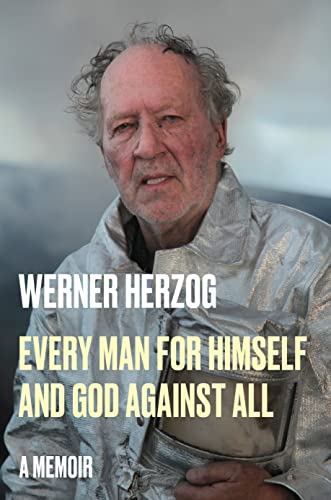
Every Man for Himself and God Against All: A Memoir
Werner Herzog, Michael Hofmann
About the Author

Werner Herzog
Questions & Answers
Werner Herzog intertwines his personal experiences, family history, and cinematic endeavors throughout his memoir by narrating his life's journey through the lens of his films. He reveals his creative process by discussing his early inspirations, such as his fascination with the cosmos and his experiences with extreme situations, which often find their way into his films. His family history, particularly his grandparents' stories, shapes his understanding of identity and history, influencing his films' thematic depth. Herzog's narrative also reflects his worldview, which is characterized by a deep curiosity about the human condition, a respect for nature, and a belief in the transformative power of art. His exploration of truth, reality, and the limits of human understanding are central to his work, as seen in his films' exploration of the extraordinary and the ordinary. Herzog's memoir thus serves as a testament to his lifelong pursuit of understanding the world through storytelling and visual art.
Werner Herzog's films and personal life are deeply intertwined with themes of transcendence, the unknown, and the risks of pursuing passions. His films often depict characters facing extreme situations, embodying a desire for transcendence. For instance, "Aguirre, the Wrath of God" portrays a quest for the mythical city of El Dorado, reflecting the human yearning for the unknown and the divine. Herzog's documentaries, like "Cave of Forgotten Dreams," explore ancient cave paintings, symbolizing the quest for understanding the unknown past.
In his life, Herzog's adventures and filmmaking often involve risks. The production of "Fitzcarraldo" was fraught with challenges, including lost negatives and treacherous jungle conditions. His documentaries, such as "Into the Abyss," often delve into the depths of human darkness, showcasing the risks associated with exploring the unknown. Herzog's willingness to face these risks and his unwavering pursuit of his passions illustrate the risks and rewards of seeking transcendence and understanding the unknown.
Werner Herzog employs mythological figures, historical events, and personal experiences to weave narratives that blur the lines between reality and fiction. He often intertwines these elements to create a sense of the extraordinary, the enigmatic, and the otherworldly. In "Every Man for Himself and God Against All," he recounts his life and work, intertwining personal anecdotes with historical accounts and mythological references to create a narrative that is both personal and universal.
Herzog's approach to storytelling suggests a belief in the power of storytelling to reveal deeper truths about the human condition. By intertwining personal experiences with broader historical and mythological contexts, he suggests that individual stories are part of a larger tapestry of human experience. This method allows him to explore themes of fate, destiny, and the human struggle against the forces of nature and history. Herzog's storytelling style, therefore, reflects a commitment to the exploration of profound questions through the lens of personal narrative, suggesting that the boundaries between fact and fiction are fluid and that both are essential to understanding the human story.
Herzog's reflections on historical and cultural moments, such as German reunification and the impact of World War II, significantly contribute to the themes of identity, memory, and the human condition. His narrative intertwines personal experiences with broader historical events, illustrating how individual lives are shaped by larger historical forces. His exploration of his family's history, including his father's Nazism and his own experiences during the war, highlights the complex nature of identity and the legacy of historical events. Herzog's focus on memory, particularly collective memory, underscores the idea that history is not just a series of events but a living, evolving narrative that shapes our understanding of ourselves and the world. His reflections also underscore the human condition, revealing the resilience and adaptability of humans in the face of adversity, as well as the capacity for both great evil and profound goodness. Through his narrative, Herzog invites readers to consider the interconnectedness of individual lives and the broader historical tapestry, emphasizing the universal aspects of the human experience.
Werner Herzog believes that art and creativity are essential in facing adversity and navigating the complexities of modern life. He views art as a means to explore the human condition, confront existential questions, and offer a sense of meaning and purpose. Herzog exemplifies these beliefs in his work through his unconventional and often risky filmmaking methods, which often involve extreme locations and situations.
In his films, Herzog often delves into themes of isolation, the unknown, and the human struggle. For instance, "Aguirre, the Wrath of God" explores the quest for power and the futility of human ambition, while "Fitzcarraldo" challenges the limits of human endeavor. His documentaries, like "Grizzly Man," delve into the depths of human psychology and the natural world, highlighting the fragility and resilience of life.
Herzog's work also emphasizes the importance of collaboration and the collective spirit. He often works with non-actors and local communities, allowing their stories and perspectives to be heard. This collaborative approach reflects his belief in the power of shared experiences to foster understanding and empathy.
In summary, Herzog believes that art and creativity play a crucial role in society by providing a means to explore the human condition, confront adversity, and foster a sense of connection and understanding. He exemplifies these beliefs through his innovative and thought-provoking films that often push the boundaries of traditional storytelling.